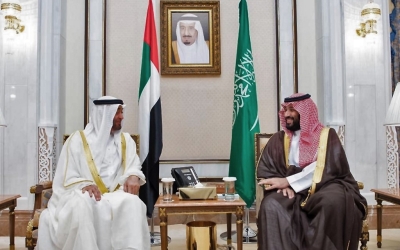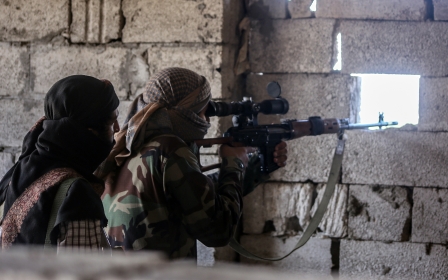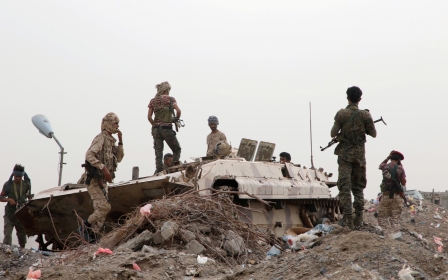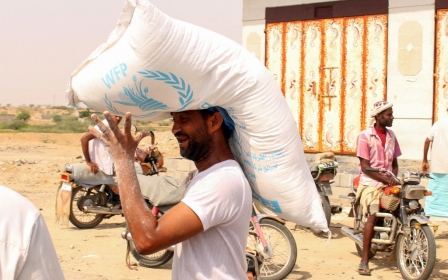Yemen's southern secessionists take their battle to the oil-rich east
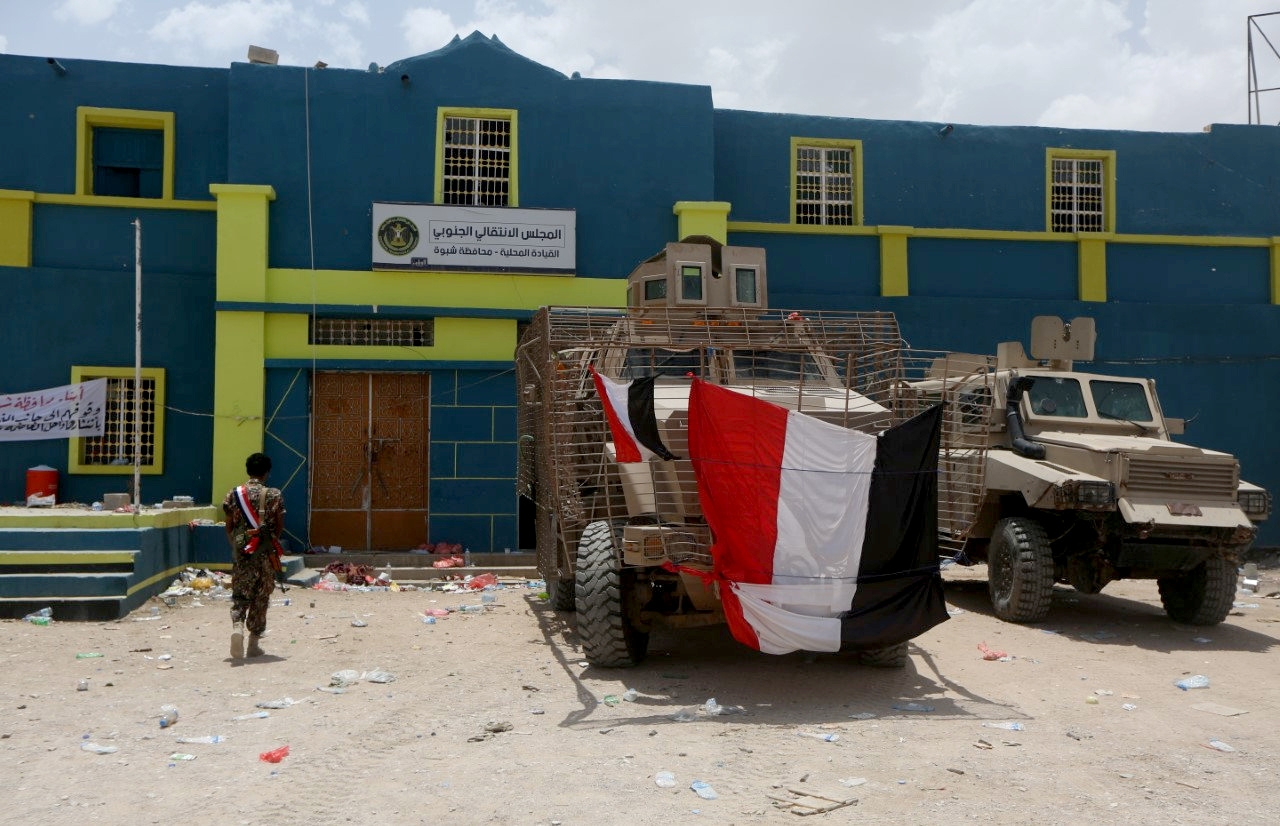
The battlefield in southern Yemen has been expanding since early August, as Saudi-backed pro-government forces and UAE-backed separatist forces compete for control in the region.
In recent weeks, the UAE-backed Southern Transitional Council (STC), a secessionist group calling for the independence of southern Yemen, has seized control of large areas of Yemen's south, including the city of Aden and much of the neighbouring Lahj, Abyan and Taiz provinces.
The STC is currently setting its sights on the oil-rich province of Shabwa, 385km east of Aden.
The Shabwani Elite Forces (SEF), a militia loyal to the STC, attacked pro-government forces in Shabwa on Thursday and captured several areas, including the capital of the province Ataq.
The SEF was established by the United Arab Emirates in 2016 to establish a hold across the governorate - a move not welcomed by Saudi forces operating in the area.
New MEE newsletter: Jerusalem Dispatch
Sign up to get the latest insights and analysis on Israel-Palestine, alongside Turkey Unpacked and other MEE newsletters
Pro-government forces recaptured Ataq on Saturday, and seized control of the province’s remaining districts on Monday, as the fighting moved towards the road between Shabwa and Abyan province.
Yemeni Prime Minister Maeen Abdulmalik Saeed and a number of ministers visited Shabwa on Sunday, where they met with the governor, pro-government military leaders and the leader of the Saudi forces in the province.
“Shabwa supports [Yemeni President Abd Rabbuh Mansour] Hadi and his government and we are not willing to let any side invade it,” Ahmed Nasser, a pro-Hadi tribal fighter, told Middle East Eye.
“We confronted the Houthis and did not allow them to take over Shabwa and we will do our best to save it from any other militia.”
Nasser said that many of Shabwa’s residents did not like the scenario of Aden, which they saw as an STC coup.
“I demand the independence of the south but… I am against all of STC’s actions, which do not represent the people of Shabwa,” he said.
Nasser said tribal fighters in the province were fighting alongside pro-Hadi and Saudi forces, while most of SEF’s fighters were not locals, coming instead from Lahj and Dhale.
The SEF has been receiving military reinforcements since Thursday, and its forces have started gathering on the main road between Shabwa and Abyan, ready to attack the province at any moment.
“We do not fight for the sake of money, but for the sake of peace," Nasser said. "All of Shabwa’s tribes have agreed to fight the militia in order to help the government operate normally in the province.”
SEF fighters and 50 Emirati armoured vehicles on Monday withdrew from Belhaf oil seaport, one of Shabwa’s main ports, towards Abyan and Hadhramout, Nasser said.
He added that some SEF deserters joined the pro-government camp.
Battle did not end
Dozens have been killed and wounded in the fighting for Shabwa.
Colonel Mohammed Salem al-Bouhar, commander of the SEF who was also wounded, on Monday called upon his forces on “all frontlines” to resume fighting to “liberate” Shabwa from “traitorous members”.
“In the next few hours, I will resume leading the battle to liberate Ataq and all other districts,” he said in a video uploaded online.
Ayman, a former teacher and an STC fighter, said the SEF withdrew from Ataq and other areas after tribal mediations led to a ceasefire agreement.
Ayman claimed that pro-government forces have not been complying with the ceasefire.
“The SEF, with the support of the Security Belt Forces, is regrouping and it will liberate Shabwa soon,” he told MEE from Aden, using only his first name for security reasons.
“The STC represents the whole south and it should take total control of the south in order to start the next step of achieving independence,” he said.
Meanwhile, Reuters reported that Saudi Vice Minister of Defence Khalid bin Salman had come out in support of a ceasefire.
"Internal dialogue, and not fighting, is the only way to resolve internal Yemeni differences," bin Salman, one of the sons of King Salman, tweeted on Monday. "We are working with the UAE for security and stability in Aden, Shabwa and Abyan and...to unify ranks and voices to combat terrorist threats, whether from the Iran-backed Houthis or from al-Qaeda and Daesh (Islamic State)."
There are five oil fields, three airports and three seaports in Shabwa, making it one of the richest provinces in Yemen.
“Shabwa’s oil wealth represents a main income for the country and we should recapture it from the northern government to restore the income of the south,” Ayman said.
Fighting over the oilfields
Yassin, an engineer with an international oil company in Shabwa, said that the province’s oil wealth will lead to lengthy and intense battles.
“The fighting in Shabwa is over the oilfields and the STC hopes to capture these fields, but the government will not easily give them up,” Yassin told MEE, using only his first name for security reasons.
Underscoring the importance of the eastern province, Yassin pointed out that when Aden fell into the hands of the STC, government officials did not visit the city, unlike Sunday’s visit by high-ranking officials to Shabwa to “encourage pro-Hadi fighters to advance”.
'Shabwa’s oil wealth represents a main income for the country and we should recapture it from the northern government to restore the income of the south'
- Ayman, STC fighter
The Emirati forces used to control the Belhaf oil seaport, where oil production has stopped since 2015.
Shabwa residents who spoke to MEE said they hope that Hadi’s government can now resume the production of oil in Belhaf.
“Oil production in Belhaf oil seaport stopped in 2015 and that has affected the national economy,” said Ahmed Sharaf, a former oil company worker in Shabwa. “Oil production can ease the economic crisis as Yemen starts receiving foreign currency from oil exportation.
"But I believe the government will face problems producing and exporting oil in the middle of war.”
Middle East Eye delivers independent and unrivalled coverage and analysis of the Middle East, North Africa and beyond. To learn more about republishing this content and the associated fees, please fill out this form. More about MEE can be found here.


